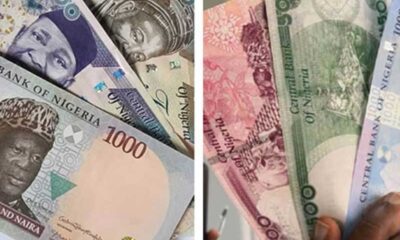Money market
Naira depreciates by 0.17% at official market
By David Awoyemi
Naira depreciated by 0.17 per cent yesterday at the official Investors and Exporters (I & E) Window as the Central Bank of Nigeria (CBN) struggles to sustain its float-management stance.
Trading report obtained indicated that naira depreciated to N463.67 per dollar as against its previous close of N462.88 per dollar.
Most participants at the official foreign exchange (forex) window maintained bids between N460.00 and 466.00 per dollar.
The depreciation in naira at the forex market comes as the apex bank seeks to sustain its controlled rate at the official window, despite some 300 basis points gap between the official rate and the parallel market rate.
Most non-government, private independent users source forex from the parallel market, which is being funded by private sources seeking higher margins and round-tripping of funds from the official window.
Nigeria’s foreign exchange (forex) reserves had hit a new low at $35.39 billion last weekend amidst dwindling inflows and apprehensions over the country’s forex management framework.
The nation’s external reserves had dropped by $111.10 million to $35.39 billion at the weekend, its 11th consecutive weeks of decline.
Nigeria’s forex reserves had lost more than $1.82 billion in nearly three months of a free fall. Official forex reserves status data report obtained from the CBN indicated that forex reserves had depleted from $37.211 billion by January 16, 2023 to $35.39 billion at the weekend.
Nigeria’s external reserves, which closed 2022 at about $37.08 billion, had picked at $37.211 billion on January 16, 2023. It has since been on the decline, dropping to lower level every week over the past 10 weeks.
Most analysts agreed that Nigeria’s shaky forex reserves position and currency crisis were directly due to the CBN’s currency management stance. The apex bank’s fixed-rate, controlled exchange policy has seen the emergence of parallel markets with some 290 basis points between the official rate and the market-driven, unofficial parallel market.
Analysts have also called for major forex and macroeconomic reforms to stem decline and encourage direct and indirect forex inflows into the country.
Analysts at Cordros Capital said they believe the forex crisis “will remain over the short-to-medium term” as there is no positive signal that denotes an improvement in forex supply relative to the pre-COVID-19 levels.
“Moreover, considering the tepid accretion to the reserves given low crude oil production and elevated premium motor spirit (PMS) under-recovery costs, foreign portfolio investors (FPIs) who have historically supported supply levels in the Investors & Exporters Window will be needed to sustain forex liquidity levels in the medium to long-term,” Cordros Capital stated at the weekend.
Analysts at Cordros Capital attributed the persistent slowdown in capital importation to foreign investors’ lacklustre interest in the country “given an unclear foreign exchange framework, an uninspiring macro narrative, elevated global interest rates, and heightened global uncertainties.
“While we believe a new government will be a breather for the country in the short term as sentiments are likely to improve, we think foreign capital inflows will remain low compared to pre-COVID levels over the medium term in the absence of significant reforms in the forex, fiscal and monetary policy frameworks,” Cordros Capital stated.
Further Analysts at Afrinvest (West Africa) said Nigeria’s capital importation continues to weaken below its pre-Covid level of $24 billion, “primarily due to the investors’ aversion to subsisting forex policies.”
“Specifically, the prominence of capital controls to manage the ongoing forex crisis complicates fund repatriation from Nigeria and, by the same token, discourages new investments by offshore players,” Afrinvest stated.
Money market
Lagos, India to boost trade partnership


The Lagos Chamber of Commerce and Industry and the Confederation of Indian Industry have signed an agreement to boost trade partnership.
In a memorandum of understanding in Lagos on Tuesday, both parties observed that the agreement would enhance avenues for effective collaborations.
Lagos Chamber of Commerce and Industry Deputy President Knut Ulvmoen said that the partnership’s focus was to leverage the trade capacity of both parties.
Ulvmoen said that both parties would explore capacity in Information and Communication Technology, medical, training, agriculture, manufacturing and export, among others.
He acknowledged what he described as robust and enduring trade relations between Nigeria and India.
He noted that over the years, both nations had witnessed a steady growth in bilateral trade with significant contributions from various sectors.
“Today’s meeting serves as a platform to, not only strengthen the existing partnerships, but also to forge new alliances that will contribute to the sustainable growth and development of both nations.
“Together, we must seize this moment to identify synergies, exchange expertise, and explore innovative solutions to economic challenges.
“Let us leverage the collective wisdom of our industries to develop actionable strategies that will drive inclusive growth, foster entrepreneurship, and enhance competitiveness,” he said.
Indian High Commissioner Shri Balasubramanian expressed his belief in shared growth and prosperity by both countries.
He also emphasised the importance of Nigerian-Indian business collaboration.
Balasubramanian stated that the government of India was making efforts to build capacity in trade, seeking private sectors’ partnership to identify projects that could be profitable to the trade structure of both countries.
“The opportunities existing between both countries are enormous as more than 155 Indian companies in Nigeria employ many Nigerians.
“From oil to steel; to healthcare, we are willing to link Nigerians up with their counterparts in India as we explore avenues of collaboration and partnership,” he said.
Money market
Naira remains at N1,350 as CBN targets FX inflow for liquidity boost


The naira on Tuesday steadied at 1,350 per US dollar on the parallel market, popularly called black market.
On Monday morning, the naira opened the foreign exchange (FX) market at the same rate before closing at N1,360/$1 on the same day at the black market.
At the official market known as the Nigerian Autonomous Foreign Exchange Market (NAFEM), the naira on Monday fell to 1,419.11 per dollar, the lowest since March 13, 2024 at the official FX market, following slowing inflows occasioned by the withdrawal of funds by Foreign Portfolio Investors (FPIs).
The intraday high closed at N1,451 per dollar on Monday, weaker than N1,410 closed on Friday. The intraday low also depreciated marginally to N1,060 on Monday as against N1,051/$1 closed on Friday at NAFEM, data from the FMDQ Securities Exchange indicated.
Dollars supplied by willing buyers and willing sellers declined by 52.16 percent to $147.83 million on Monday from $309.01 million recorded on Friday.
On day to day trading, the naira weakened by 5.63 percent as the dollar was quoted at N1,419.11 on Monday as against N1,339.23 quoted on Friday at NAFEM.
During the recent Monetary Policy Committee (MPC) meeting, Governor of the Central Bank of Nigeria (CBN), Olayemi Cardoso, emphasised the critical need to attract inflows to maintain liquidity in the foreign exchange market and stabilize the exchange rate.
In his statement, Governor Cardoso highlighted the importance of addressing inflationary pressures through exchange rate management to safeguard both price stability and long-term economic growth.
“Failure to tame inflationary pressure using the exchange rate channel may jeopardise not only price stability but also long-term growth,” stated Governor Cardoso.
Addressing concerns raised at the March 2024 MPC meeting, Governor Cardoso emphasised the need to reduce negative real interest rates to attract capital flows and enhance liquidity in the FX market. He stressed the significance of attracting capital flows through foreign portfolio investments and moderating exchange rate pressures to mitigate the impact of exchange rate pass-through on inflation, particularly in Nigeria’s import-dependent economy.
Commenting on the monetary situation, Mustapha Akinkunmi highlighted a decline in Nigeria’s reserve money by 24.91 percent to approximately N22.2 trillion by the end of February 2024. Despite this, broad money (M3) supply increased to N93.7 trillion, contributing to inflationary pressures. Nigeria’s external reserves also decreased to US$32.87 billion as of March 19, 2024, from US$33.68 billion in February 2024.
Although current reserves cover imports for 5.7 months of goods only and 4.5 months of goods and services, the country’s ability to repay short-term debts using reserves exceeded the threshold at 104.0 percent, he said.
According to him, the reserves-to-broad money ratio of 33.1 percent surpassed the 20.0 percent threshold, indicating Nigeria’s capacity to manage capital flows effectively.
Governor Cardoso’s emphasis on attracting inflows and managing exchange rate pressures underscores the CBN’s commitment to maintaining stability in the FX market and combating inflationary challenges in Nigeria’s economy.
Money market
Mobile channel most vulnerable, as financial institutions lose N17.67bn to fraudsters in 2023


Latest report by the Nigeria Inter-Bank Settlement System (NIBSS) on Annual Fraud Landscape (January to December 2023) has revealed that commercial banks, Point of Sales (PoS) operators and others lost about N17.67 billion to fraudsters in 2023.
The report published on its website on Monday identified mobile channels as the most vulnerable avenue for fraudsters notably Web and POS businesses.
The report noted that fraud perpetrated via mobile channels increased by five percent compared to the previous year.
It also suggested some of the regulations inputted to check fraud in financial institutions need detailed examination, modification and reinforcement.
According to the statistics revealed by the report, fraud count dropped by six percent to 95,620, as actual loss from fraud grew by 23 percent in 2023 when compared to 2022 with the first quarter being the month with the highest fraud volume in 2023 and the fourth quarter being the month with the highest fraud value.
It also disclosed that the month of May recorded the highest fraud count of 11,716, followed by February with 9,492 while October saw the highest actual loss in 2023 at N3.7 billion, followed by January with N2.7 billion. It said the count of Web Fraud decreased by 38 percent and ATM fraud recorded a 64 percent reduction from 2022 to 2023.
Also, in 2023, people aged 40 and above remained the primary targets of fraudsters, which NIBSS said signified a persistent focus on the targeting strategy of fraudsters.
“This sustained trend emphasises the enduring appeal of the demographic group as potential victims, reinforcing the need for continuous efforts to educate and protect individuals in this category from fraudulent activities,” NIBSS said.
In 2023, a total of 80,658 unique customers fell for the gimmicks of fraudsters which is four per cent less than 84,130 customers recorded in the previous year.
“This decline, though apparent, does not diminish the severity of the issue, urging the financial industry to remain vigilant, enhance security measures and collaboratively address the tenacious challenges posed by fraud,” it said.
-
capital market2 years ago
Rt.briscoe, FBNH, Others halts negative performance of stock market
-
Finance3 months ago
Court orders Sen. Victor Umeh to repay N136m bank debt to AMCON
-



 Abuja Update2 months ago
Abuja Update2 months agoUNDP, FG partnership needed to achieve inclusion, equity- Minister
-
Abuja Update1 month ago
Banks drive stock market performance with N147bn gain
-



 Business2 weeks ago
Business2 weeks agoTingo Group unveils Tingo Electric, Tingo Cola drink at Lagos launch
-



 Health3 weeks ago
Health3 weeks agoCapacity training will reduce migration of health workers- NPHCDA
-
News4 months ago
Oil thieves sponsoring malicious media campaign against Navy – Spokesman
-



 Infotech1 month ago
Infotech1 month agoWorld Backup Day: NITDA urges Nigerians to ensure backup of data













